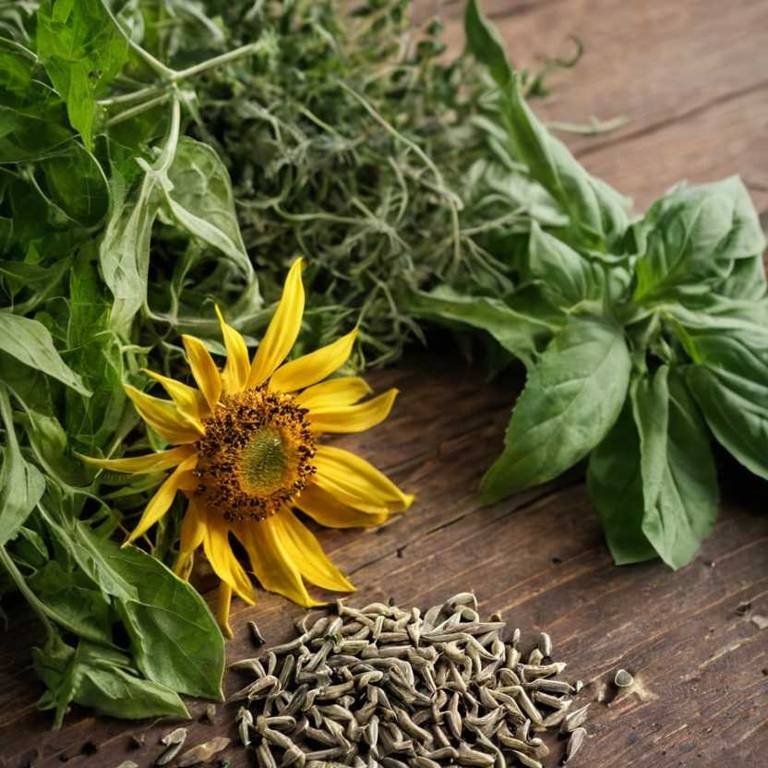Sunflower (Helianthus annuus)
Sunflower (Helianthus annuus) is a member of the Asteraceae family, native to North America, United States, and Mexico. Traditionally, its seeds, flowers, and leaves have been used for decoctions, culinary uses, and infusions.
This herb is particularly valued for its anti-inflammatory, bitter, and diuretic actions, and has a long history of use in native american herbal medicine, european herbal medicine, and traditional chinese medicine.

Quick Facts / Key Information
| Common Name | Sunflower |
|---|---|
| Scientific Name | Helianthus annuus |
| Plant Family | Asteraceae |
| Genus | Helianthus |
| Species | annuus |
| Native Range | North America, United States, Mexico |
| Plant Parts Used | Seeds, Flowers, Leaves |
| Primary Medicinal Actions | Anti-Inflammatory, Bitter, Diuretic |
| Primary Traditional Systems | Native American Herbal Medicine, European Herbal Medicine, Traditional Chinese Medicine |
| Historical Preparation Methods | Decoction, Culinary Use, Infusion |
Botanical Identity
- Scientific Name
- Helianthus annuus
- Common Name
- Sunflower
- Synonyms / Alternative Names
- Annual Sunflower, Sunflower, Common Sunflower
- Plant Family
- Asteraceae
- Genus
- Helianthus
Botanical Description
- Growth Habit
- Annual herbaceous plant.
- Height
- It typically grows to a height of 1 to 3 meters.
- Leaves
- Broad leaves with upper surface glabrous and lighter green, lower surface pubescent and darker green, exhibiting prominent midrib and lateral venation.
- Flowers
- Radially symmetric flowers with yellow disk and orange to yellow ray florets arranged in a single terminal head.
- Stems
- Elongated, erect growth habit, opposite branching pattern, glabrous surface, pithous vascular bundles.
Traditional Uses / Historical Use
Traditional Systems
- Native American Herbal Medicine
- European Herbal Medicine
- Traditional Chinese Medicine
Historical Preparation Methods
- Decoction
- Culinary Use
- Infusion
- Poultice
Medicinal Actions
- Anti-inflammatory
- Traditionally described as a warming anti-inflammatory, for irritation-related applications.
- Bitter
- In herbal literature, noted as a gentle bitter, for flavor-based applications.
- Diuretic
- In herbal texts, considered a calming diuretic, for moisture-related balance.
- Tonic
- Commonly referenced as a soothing tonic, for foundational support.
Active Compounds
- Flavonoid
- A chemical class commonly identified in plant tissues, especially flowers and leaves.
- Phenolic Acid
- Organic acids commonly occurring as part of plant secondary metabolism.
- Terpenoid
- A diverse group of organic compounds present in many aromatic plants.
- Tannin
- High-molecular-weight phenolic compounds found in many plant species.
Modern Research Overview
Modern scientific investigation of this plant has focused on identifying its chemical constituents and examining their properties in controlled research settings. Comprehensive study summaries will be incorporated into this section as additional sources are reviewed.
Safety & Contraindications
- General Precautions
- The use of this herb may warrant general caution in certain situations.
- Contraindications
- Reported information suggests that this herb may be contraindicated in specific circumstances.
- Allergies
- Allergic reactions associated with this herb have not been well documented.
- Drug Interactions
- Interactions with prescription medications have not been well documented.
- Toxicity
- The toxicity profile of this herb has not been clearly established.
- Pregnancy & Breastfeeding
- Available information regarding use during pregnancy or breastfeeding is limited.
Preparation & Usage Methods
- Infusion
- Plant material is steeped in hot water to extract water-soluble compounds.
- Decoction
- This method uses sustained heat to extract compounds from firm plant structures.
- Poultice
- This method uses direct contact between plant material and the skin.
- Culinary Use
- Plant material is incorporated into food or beverages for flavor or aroma.
- Infused Oil
- This method allows plant material to release constituents into oil.
Growing, Harvesting & Storage
Growing / Cultivation
- Soil
- Prefers loamy soil with well-drained conditions. Typically grows best in nutrient-rich soils.
- Sunlight
- Thrives in full sun. Tolerates full sun to partial shade.
- Watering
- Prefers well-balanced moisture levels. Tolerates periodic dry conditions.
Medical Disclaimer
The information provided on this page is for educational and informational purposes only. It is not intended to diagnose, treat, cure, or prevent any medical condition. Always consult a qualified healthcare professional before using any herb for medicinal purposes.